Stories
Never too late: father of eight is reunited with his children at last
Six years ago, David Kenene was welcomed to the U.S. by World Relief Memphis. His eight children, however, had been left behind during the immigration process. After years of waiting, he was finally able to reunite with them this month. This is his story, as told to our summer intern Cierra Hunter.
I am Ugandan. I came to Memphis as a refugee. World Relief, they helped me a lot. I remember they took me to Christ Community; I went with Brother Andrew [a World Relief staff member]. When I reached Christ Community [a not-for-profit community health center] I was thinking about my family, the way I had left them and thinking about how they are doing now.
The next day we went to the World Relief office. It was my first time there. They asked, “Do you have family?” I told them yes, I have family. My problem is that I have 8 children. When I was doing my interviews with UNHCR in Nairobi I listed only 4 children when I have 8. I was told by a friend over there, “Never say that you have many kids because they don’t want people who have many kids. You will never be resettled; you will have to stay here.” That’s why I listed only 4 kids.
I didn’t eat those days because I was thinking about my family.
When I was at World Relief, I explained to them what was going on.
Katie said, “It’s okay, David. Can we pray?”
I said, “Yes, we can pray.”
Katie introduced me to Catherine, my caseworker, and Courtney, who told me, “We are going to work on this issue.”
I told them their names and how old they are. They told me, “Okay, we are going to work on it.” I was given hope that they were going to work on my concern so then I started working on what they asked me to do.
I thank God and I thank those people. They did a good job, they did a good job, they did a good job.
When asked about his hopes for his kids as they are reunited David shared: I want them to continue school.
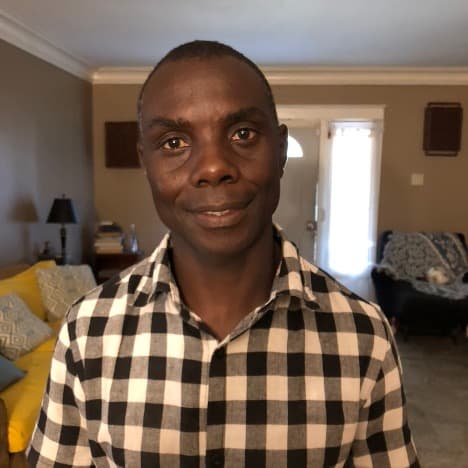
David Kenene recently bought a larger home in anticipation of his family’s arrival. 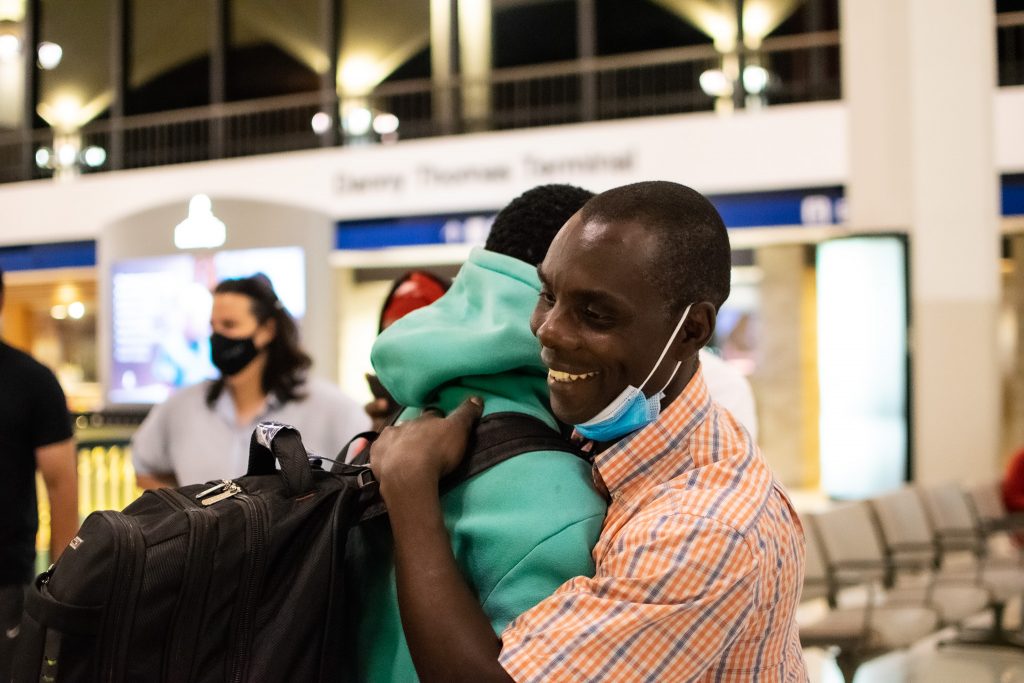
David Kinene embraces one of his younger sons after six years apart. 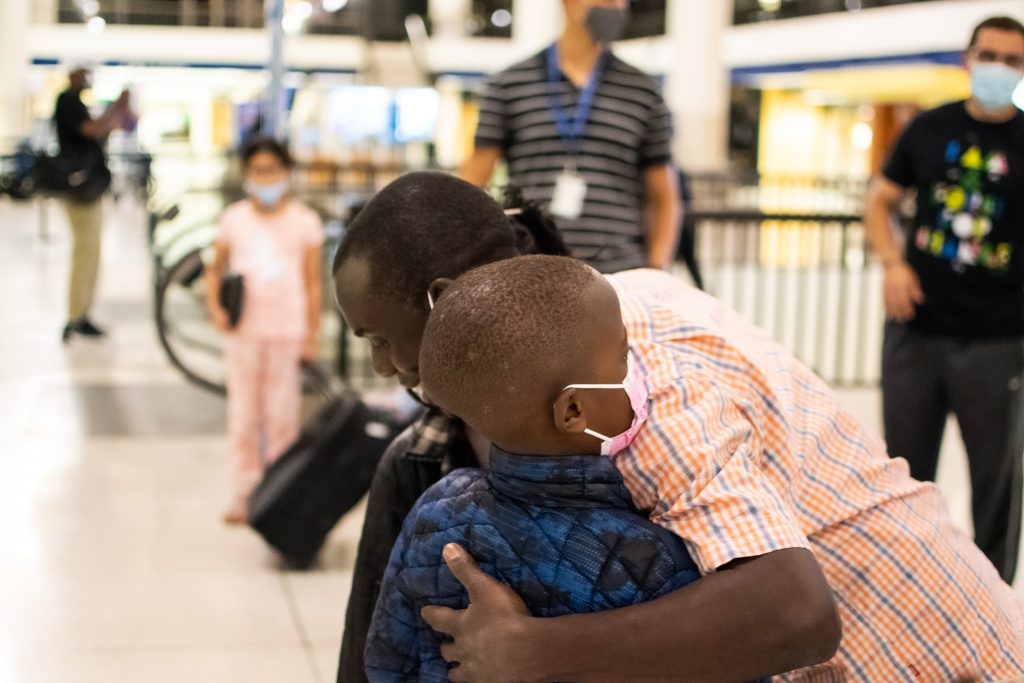
David Kenene hugs his two youngest children as they are reunited at the airport. 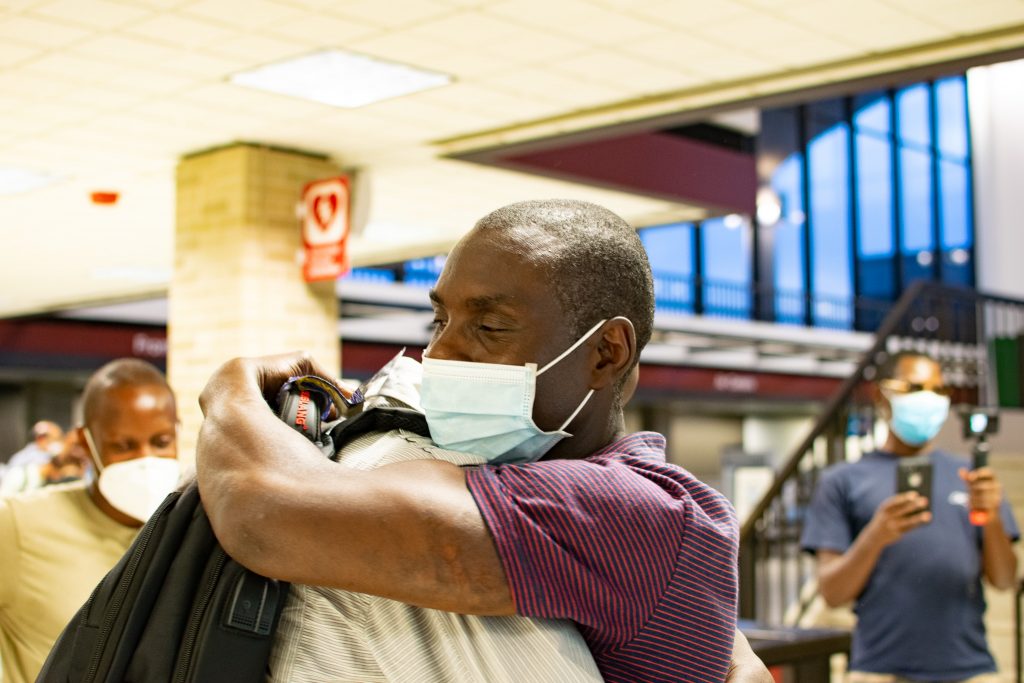
David Kenene greeting one of his sons, 18, the day they were reunited in Memphis. 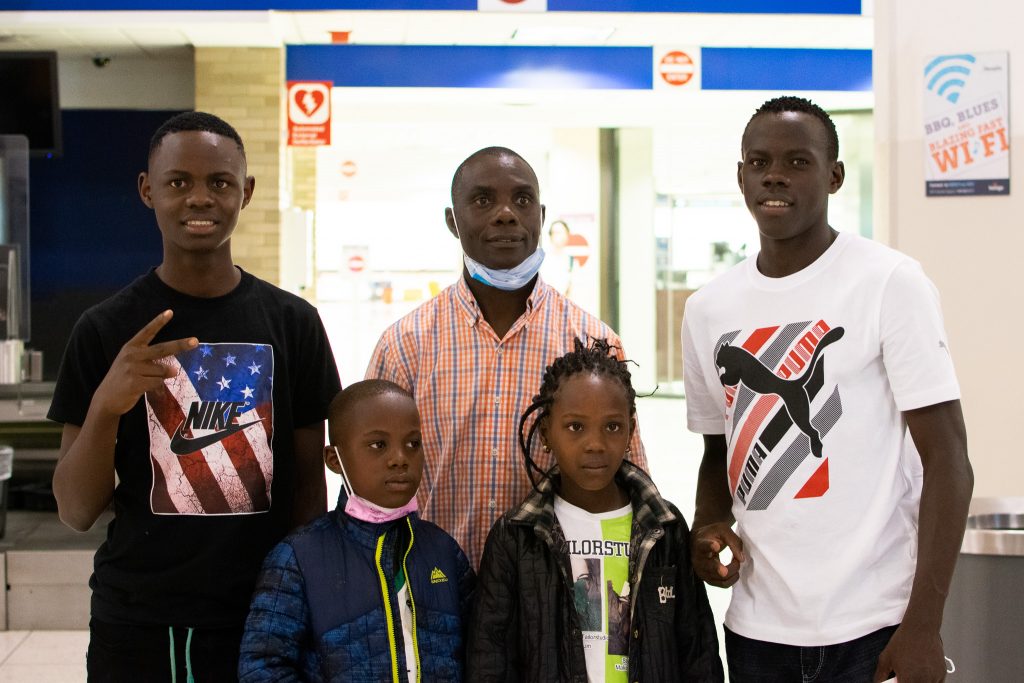
Four of David’s eight children arrived in the U.S. within one month of each other.
Facing big dreams: American citizenship makes them reality
This summer, our interns attended an ethical storytelling workshop in partnership with the University of Mississippi and Southern Foodways Alliance. To learn the ropes of the industry, they were tasked with interviewing immigrants within their community. Mobilization intern Peace spoke with Chisom about what being an American would mean to her.
A new normal
Growing up in Lagos, Nigeria, Chisom dreamt of leaving her home to go study abroad anywhere in the world, including the United States. “It was never a realistic dream,” She explained. “It was just something my parents mentioned a few times but was never something that was definite.” On March 30, 2017, Chisom and her family relocated to the United States, making her dreams come true right before her eyes.
She recounted the details of her journey to the U.S. with many emotions and smiles, even if the journey wasn’t a smooth one.
“It was a terrible experience because we were scared. At the place where they check your bags for contraband, the family in front of us, they checked their bags, and I don’t know what they found,” said Chisom, who is now 17 years old. “I don’t remember the situation at all, but they got deported back to the country—all five or six of them. They had huge bags, and we had a lot of stuff. It wasn’t a nice sight, honestly.”
Chisom eventually found a rhythm as her life found its new normal. She started high school and started to get accustomed to their curriculum, but her new normal was not without a few culture shocks.
“There are so many differences that I could write a whole book. Free public-school education was a huge difference. Even back in my country, they may have had ‘free’ public school education, but it wasn’t,” she said. “Here [in the U.S.], we have free public-school education where you’re given a free Chromebook to use throughout the school year, and you are given textbooks to use, and all you need to do is check it out. You don’t have to pay any amounts except if you lose it.”
On top of the differences in schooling, she also had to adjust to new standards of living.
“Anytime I think about it, I would always ask myself ‘How did I do this?’ There was never constant electricity back home. I feel it is all about adaptation because we were born into it,” Chisom explained.
The American dream
When asked about the reasoning behind her parents’ decision to migrate to the United States, she stated that it was simply the American dream.
“The American dream is what sold them, that when you come to America, you have a better life, and you have more opportunities for a better life, you get to explore more aspects of your life,” she said. “I think that is what pushed them to bring I and my sister to this country: to have opportunities that they didn’t have.”
In February 2020, Chisom found her life taking a turn for good when she got her legal permanent resident status, which meant that she was officially a green card holder and could apply for citizenship in the near future.
After stating that she is very happy about the turn of events in her life, she began to explain what a U.S. citizenship meant to her.
“America is known as the land of the free and the land of opportunities. Being a citizen means that I will be given the freedom to explore and utilize these many opportunities. I have been able to apply for scholarships that are only given to U.S. citizens, even as a legal permanent resident.”
Chisom, 18
One of those newfound freedoms would be helping to make decisions for her new country: “I think being a U.S. citizen entails knowing the constitution, knowing the privileges you have when you become a citizen, like voting. So, that would mean that I would partake in huge decisions of choosing leaders for my community, my state, or even in the country at large.”
She also spoke about the benefits of being able to travel to places like Austria, Qatar, Ukraine, and countries that don’t require a visa when you have your U.S. passport.
“This opportunity will help me explore many places while expanding my knowledge on how the healthcare system works in various places, preparing me for my career as a doctor,” she says.
Turning dreams into reality
Like many immigrant children, Chisom is not afraid to face her big dreams. She has dreamt of being a doctor since she was little and cannot see herself doing anything else.
Chisom graduated from high school in May and will be continuing her education at the University of North Georgia in the fall as she works towards her goal. She stated that the opportunities that a U.S. citizenship offers will help her achieve her dream of helping underserved communities and, hopefully, to help better the healthcare system of her homeland, Nigeria.
“Being a U.S. citizen is definitely going to help me achieve that. If I decide to build a hospital, I am pretty sure there’s paperwork and things that require my citizenship—maybe to have land rights and other things,” Chisom said.
The conditions of the healthcare system of Nigeria continue to be the driving force of her motivation to become a doctor. “I saw a video of them giving the COVID-19 vaccine, and the environment was not good at all. I almost cried,” she said.
Even without COVID, other problems still exist within their healthcare system such as self-diagnosis. “You feel weak, and all of a sudden it’s ‘malaria.’ You start taking malaria drugs every day, but it never occurs to them that they might have some other underlying problems,” she explained. “That is the sad reality.”
While Chisom continues to worry for her home country, she believes that her dreams can be achieved when she becomes a U.S. citizen, and she is grateful for the opportunity.
Peace joined the Mobilization Department as an intern in Spring 2021. She’s currently a sophomore at Rhodes University studying biology.
Grateful to Be a Citizen
Paw Shee loves to read, especially books that teach her about “what happened in the past.” And on her journey to becoming a citizen, citizenship classes became a platform that fueled that desire to learn.
“I love to read the books they gave me about U.S. history,” Paw said, emphasizing, “they gave me whole books!”
Paw recently completed two citizenship courses with two different instructors. Both commended her hard work and her ability to read in English.
“She could read English very well, she always had her homework done,” recalled Susan Llewellyn, Paw’s instructor during her second round of classes, “she always read everything for each assignment.” Sometimes, Paw would be chapters ahead of the assigned reading.
Despite her love for reading and compliments from both of her teachers, however, she expressed concern about her English skills. She wants to be “treated like a citizen,” viewed by others without judgement or fear. For Paw, citizenship means a different way to be seen.
“I wanted to be seen like I am a citizen when I go somewhere. If they question, ‘are you a citizen?’ I want to answer yes,” Paw said.
Llewellyn believes that understanding refugees’ personal circumstances helps to eliminate fear. She always asks her students to share their stories, because “what you hear on the news may be different than what you hear from a refugee.” Paw chose to share her own story in Llewellyn’s class.
She and her family sought refuge in the U.S. in 2014, shortly after faith-based persecution and violence began to escalate in their country of origin, Myanmar. They journeyed outside of the refugee camp they had been living in for the freedom to “go anywhere and practice whatever [they] want.”
Her resettlement was life-changing, and the diligence it took to make the journey followed Paw through her classes. She remained dedicated to learning even as a mother of three during last year’s shift to remote technology.
“She’s a mom, and she was a really good student. . . her kids would be there with her during classes,” Llewellyn said, “she took it seriously and was always prepared.” Paw adapted to remote class technology and completed round two of her classes with ease. Her work ethic, coupled with an innate need to learn about the world around her, drove her straight to her goal.
“I passed the citizenship test,” she said, “My oath ceremony is on July 14th.”
The oath ceremony is the final step in the citizenship process, where participants swear their allegiance and receive their naturalization certificates. It’s symbolic in its representation of hard work, reward, and the obstacles they’ve overcome in their path to citizenship.
After the ceremony, Paw plans to go back to school when she has the time. Her goals are to work on her English skills through ESL classes and complete a highschool education. She’s kept in touch with both of her instructors, to whom she has repeatedly expressed a deep gratitude.
“She’s written to me several times since. She texted me and said she passed the test, got them all right, and thanked me for helping her. She let me know she was grateful,” Llewellyn said.
Paw Shee took a risk in choosing to better herself in the face of fear. And just as she built her future through an innate desire to learn about the past, her own story will serve to inspire those who follow in her footsteps.
“I am feeling so blessed and thankful that the American government welcomes our refugees and lets people come and live here in America. Finally, I am so proud to be an American Citizen,” she said.
Written by Erica Parrigin
Safety at Last: Francois’ Story
Living in Burundi during the Civil War, Francois spent much of his life in fear. He was constantly immersed in the struggle of “two ethnicities fighting against each other.” In December of 1996, he was relocated to a Tanzanian refugee camp with little access to water or electricity. In the context of all he had experienced, safety seemed impossible. He felt frustrated and hopeless as the years passed.
“I don’t remember anything good,” he said. “It was all bad.”
Francois spent ten years in the camp, and it wasn’t until 2006 that he was given an opportunity to resettle. He was welcomed by another agency in San Diego, California. Though grateful to finally be in the US, he began to feel overwhelmed. Everything was newer. He was able to communicate with others through limited English, but he didn’t know how to get around and found it difficult to meet his new hygiene standards. He wasn’t sure how to interact with the culture.
Laughing, he recalled, “I had this idea that I was going to get money from any person I met.”
Even after going to school and becoming fluent in the language, Francois was missing another key element of a stable life in his new country. He didn’t have his citizenship. As his path toward security landed him in the Quad Cities, he found World Relief. WRQC provided the outside support that allowed him to express his concerns without fear. Eventually, with the help of WRQC, he was able to obtain his citizenship. And that’s not all.
“My wife got citizenship through World Relief. My kid got citizenship through World Relief,” he added.
Becoming a US citizen was the last major step in Francois’ journey, allowing him to become fully self-sufficient. He began to focus on the things he enjoys without worry. Because he has always “enjoyed working with people of different cultures,” he grew interested in helping other refugees. He saw a chance to help others overcome situations like his when WRQC contacted him and asked him to be an interpreter.
Today, he’s restoring faith and creating lasting change for the immigrants and refugees that visit WRQC by helping to ease the language barrier. He hopes to spread the peace he now feels after years of uncertainty. The Quad Cities has become his home, and he finally feels “safe.”
Written by Erica Parrigin
TEDxTalk: One Refugee’s Life Experience | Côme Nzibarega
Born and raised in Burundi, Côme Nziberaga has a gift for languages; he speaks five – French, Swahili, Kirundi, Amharic, and English. In 2005, languages helped him land a job as a translator for a United Nations peacekeeping force sent to Burundi, which for decades has been plagued by conflicts between the nation’s two largest ethnic groups.
By assisting the peacekeeping force, Côme became a target of a rebel group and was forced to flee to escape torture and civil war. He became a refugee in Ethiopia for six years before being invited to permanently resettle in the U.S.
After his experience, Côme shares that he believes refugee camps are the richest places in the world.
“I believe some of the problems the world faces right now, the solution is found in those refugees who do not have the opportunity to achieve the purpose they were created for. What if we saw the refugee crisis going on right now as an opportunity, not as a problem?”
Côme is now an Employment Specialist at World Relief Tri-Cities, welcoming and empowering others. He speaks in public regularly about the role of immigrants in our evolving society, hopeful as he shares his insights in order to create more inclusive communities and societies.
Hear more of his story shared at TEDx Spokane and TEDx Coeur D’Alene.
As the refugee cap hopefully increases to 125,000 in the new fiscal year, we’re entering into a new moment in America, one in which we urgently need your help to rebuild our capacity to welcome, love and support refugees and give them the opportunity to achieve their purpose. Will you join us as we rebuild here in Tri-Cities?
Saima’s Kitchen World
Growing up in Pakistan, Saima never went to school. Her family did not have internet access, so she spent her days cooking alongside her mom, preparing dishes ranging from the Afghan classic bolani to the Pakistani biryani.
Over time, she began to try different recipes that were less familiar to her and her culture—ice cream, fish sticks and lasagna. Cooking passed the time as they waited to be relocated to the U.S. after having fled terrorism in their home country of Afghanistan.
Yet when she came to the United States in 2016 with her mother, brother and sister, Saima saw a window of opportunity that had not previously been there when she discovered YouTube for the first time.
“She watches a lot of YouTube videos, and she saw that everybody posts their cooking videos, and she said ‘Why shouldn’t I?’” said her sister, who interpreted for Saima. “She loves cooking, so she posts her videos, and, hopefully, if her videos get monetized, she could earn from YouTube too.”
In their home country, Saima and her sister would never have dreamed of this possibility.
“When we moved here, I can’t imagine—back in my country I couldn’t work because it’s very hard for girls to work over there,” her sister said. “But here, I went to college; I work over here; Saima works over here. It’s much better, and of course there’s no terrorism.”
With these new doors opening, both sisters saw new futures for themselves—one in the medical field, and Saima in communications. While her sister worked and went to school, Saima worked as well, but she also taught herself everything she needed to know for her cooking channel with the help of her brother, who first introduced her to video editing.
“Now, she does it herself. She just goes into the system and finds new things,” her sister said. “There are a lot of things I don’t know how to do, but she does. She’s creative, very, very creative. I don’t know much about computers, but she does, even though she’s never been to school.”
If you look on Saima’s Kitchen World today, you’ll find dozens of videos that reflect her and her family’s story: their flight from Afghanistan, the wait in Pakistan and finally their arrival in Memphis. Despite having only tried pizza in the U.S., Saima is sure to pay homage to her adopted home with recipes such as club sandwiches.
One day, she hopes to take her cooking to the next level with paid sponsorships and eventually a cookbook after learning English and studying communications. With the help of her family, this new dream seems closer than ever.
“We get things ready for her, and she cooks it on the weekends. The other days, when she comes back from work at night time, she’ll do editing and stuff. The next week she’ll upload the video on the same weekend that she makes a new recipe,” her sister explained for Saima. “It’s very hard and time consuming. It is nonstop.”
It may be time-consuming, but it’s a labor of love that Saima is happy to continue. While waiting for her debut as a cookbook author, you can find her mastering recipes for family and friends, both American and immigrant alike.
If you want to travel around the world through cooking like Saima has done, join us this month for #Passport901 in celebration of Immigrant Heritage Month! Each week we’ll post a new recipe to try, starting with Saima’s, and by cooking it you could be entered for a chance to win a prize in partnership with Choose901. Simply post the end result to your social media account, tagging us in it and using #Passport901. The winner will be announced at the end of the month.
If you don’t have time to whip up a recipe amidst the summer holidays, fill out a volunteer application to see how else you can get involved.
I Never Expected to Be a Refugee
When Life Felt Almost Perfect
I never expected to be a refugee. I joined a university when I was 18 years old, enrolling in the English department at Basra (the Port of Iraq). At the end of my time there, I graduated second in my department. After graduation, I stayed two more years as a researcher’s assistant and then five more years when I was accepted for my master’s in the linguistics program.
I became a professor in 1987 and moved to Baghdad in 1992 to teach undergraduate and postgraduate students of the English Department at Baghdad University College of Education for Women. Life felt almost perfect, and it seemed I had great success.
For the next 10 years, I continued teaching, translating for the women’s newsletter, participating in academic, cultural and social activities, and supporting needy students during the 12-year blockade. I especially enjoyed my big extended family’s weekly gathering to have our authentic food and spend the most precious time together.
Then, in 2003, the unexpected happened. The United States invaded Iraq. This is when my life would change forever.
In hopes to rebuild my country, I stayed three years after the U.S. military arrived. However, the targeted people were the Iraqi brains. Doctors, professors, scientists and engineers were receiving life threats daily. I knew it was only a matter of time before they reached me. It was then I knew I had to leave. My sister, niece and I packed our bags to escape the ongoing danger.
Becoming a Refugee
Life had taken a sudden turn. The complete unimaginable came to be. We had never expected to be refugees. I took a one-year leave to live in Jordan, just to rethink and find some rest. However, the war continued on and when we were accepted into the States, we took our chance to go.
All I knew of America was what I had studied in literature and what I had seen from Oprah and Dr. Phil’s shows. I had an idea of what American culture would be like, but it proved to be very different.
In the beginning, our time in America was really tough. Our family had come from a comfortable background. We were different than refugees that had come from impoverished countries or refugee camps. We went from having everything to nothing and it was a shock.
My sister, niece and I cried for the next two weeks. We were depressed and longed for what life had been. But we had to move forward. Surviving a war together, we knew we were not weak, but strong. We made the decision to do whatever it took not only to survive, but to be successful again.
Razkya, my sister, took on the responsibility of home life. My niece, Shatha, was the first one to begin working and thriving (she later got her diamond star from JC Penney and now she is furthering her education in make-up artistry and fashion marketing). I applied for community college, but was rejected, even though I had studied the same courses others at the school had. My degree was not from the States and this was enough to receive their rejection.
Three months later, a glimmer of hope came. World Relief offered me a job as an Arabic interpreter and I eagerly accepted it. Not only did they offer me work, but they embraced me. They became my second family, a family I had lost from my home country. I knew this job was meant for me.
[Re]Building
Eventually, I went from working part-time with World Relief to a full-time position as a program caseworker. I now have the opportunity to advocate for refugees and immigrants just like myself. I have also served as a member of the Refugee Advisory Council for the past three years, along with starting a WhatsApp group to build community for refugee and immigrant women. This group shares needed information on health services, employment opportunities, educational support and even recipes during the COVID-19 pandemic.
I have felt so loved during my time at World Relief. I have gained a community I never imagined having in America. I have been participating in many cultural festivals in order to create a mutual understanding about our Iraqi-Arabic-Islamic culture. World Relief has given me the chance to teach about my country and culture and offers this same opportunity to other refugees.
This past year, the support and love I have received from World Relief was so important, as I endured the painful loss of my sister, Razkya. She recently passed from COVID and life has just not been the same without her. My grief is so deep. However, my niece and I do our best to press on. We are turning our grief into honor and success for Razkya.
By giving back, our family has been able to show our gratitude. My sister always did this through her cooking and had even taken on the nickname of the “Iraqi Martha Stewart.” Every year, Razkya would make her favorite dish, biriyani. She served it to our office, police station and community. It was her way of saying thank you.
It has been a long journey. Looking back, I am able to see all the ways God has worked through my life. I never expected to be a refugee. It has not always been easy, but He has always provided, from sunset to sunrise. Even through all the pain and struggle, God has given me a second family and a job I love through World Relief. I continue to give back and advocate for other refugees in hopes of bringing help to those that are experiencing the same pain I once did.
We are so grateful to Amira for sharing her story today. You can join Amira and the rest of the World Relief family as we help refugees and other immigrants [Re]Build their lives in the U.S. by giving today.
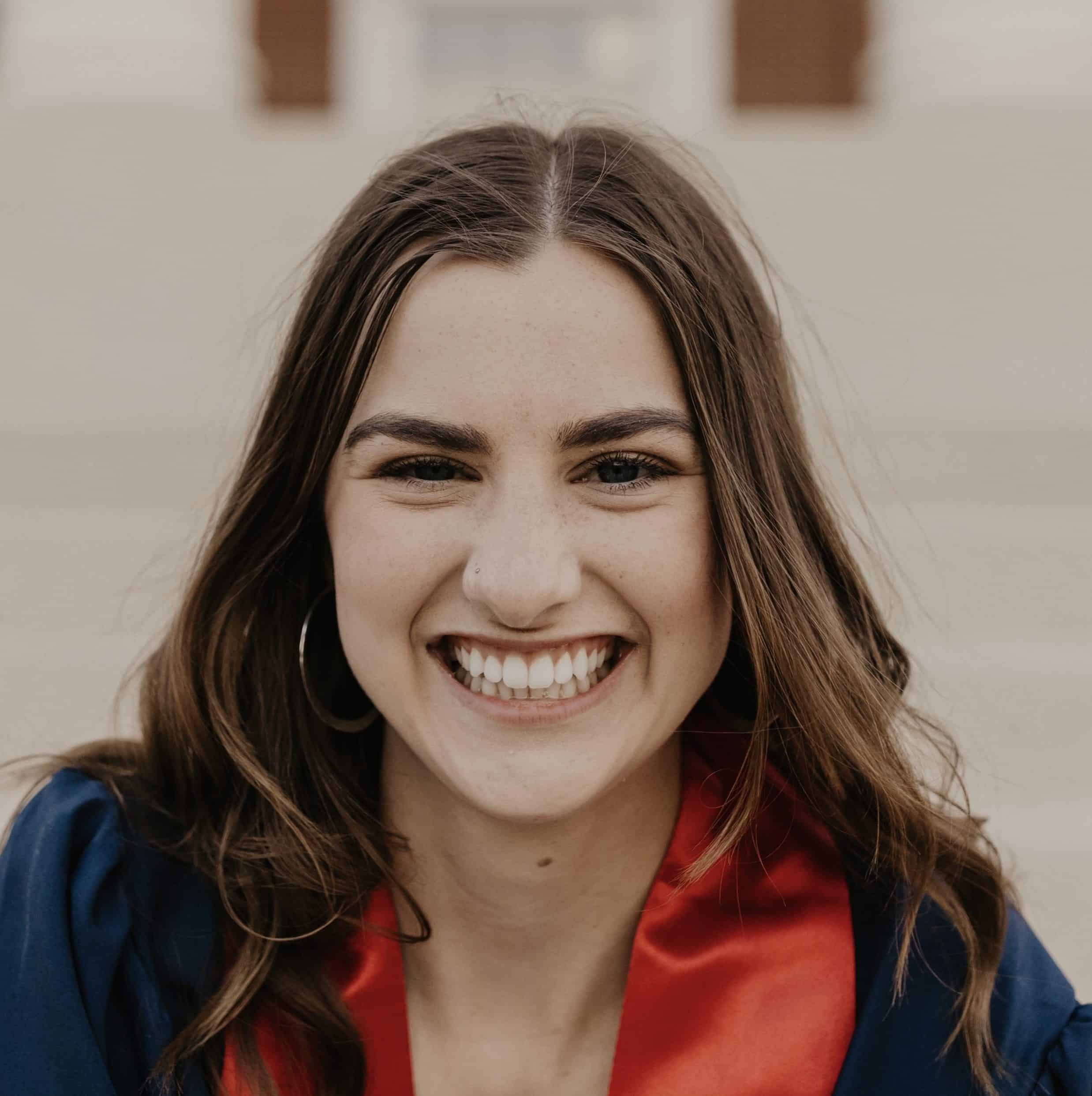
Summer Lecas interned for World Relief in Spring 2021. She is a recent graduate of Liberty University with a degree in Strategic Communication.
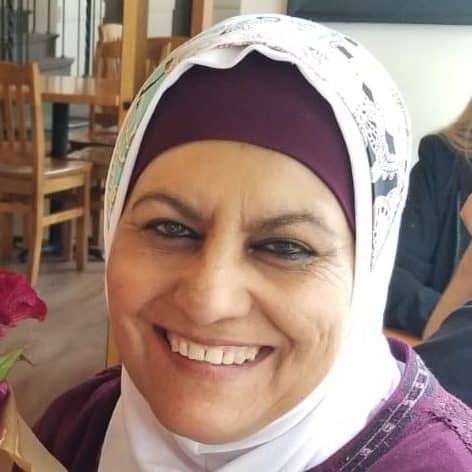
Amira Al Salami is a Preferred Communities Caseworker at World Relief Tri-Cities. She holds a master’s degree in linguistics and has more than 10 years of experience teaching as a professor in Iraq. After fleeing war in her home country, Amira came to the U.S. as a refugee in the early 2000s. Today, she is happy to advocate for refugees and teach others about Iraqi culture through her role at World Relief.
One of the Lucky Ones
On September 28, 2016, Alphonse and his sister were welcomed to the United States by World Relief Memphis staff and volunteers eager to help. Just a few months later, the number of refugees to be admitted to the United States was drastically cut.
In the span of a few months, people’s hopes and dreams of rebuilding a life in the U.S., safe from harm, were dashed. Alphonse, however, was one of the lucky ones.
“I thought ‘Wow’ because I know most people always dream to come to the US,” said Alphonse, 24. “I just realized that I’m one of the lucky ones, and I’m here.”
Alphonse was born in the Democratic Republic of Congo, but, at only two months old, he went to a refugee camp in Tanzania with his father. When his father died, he returned to the DRC, but the situation had not improved, and he moved to a new camp in Malawi with his sister.
“There were still robbers coming to break down the house, still the same thing happening with people getting killed,” Alphonse explained. “It was really hard, so my mom decided to tell me to move to the refugee camp in Malawi with my sister.”
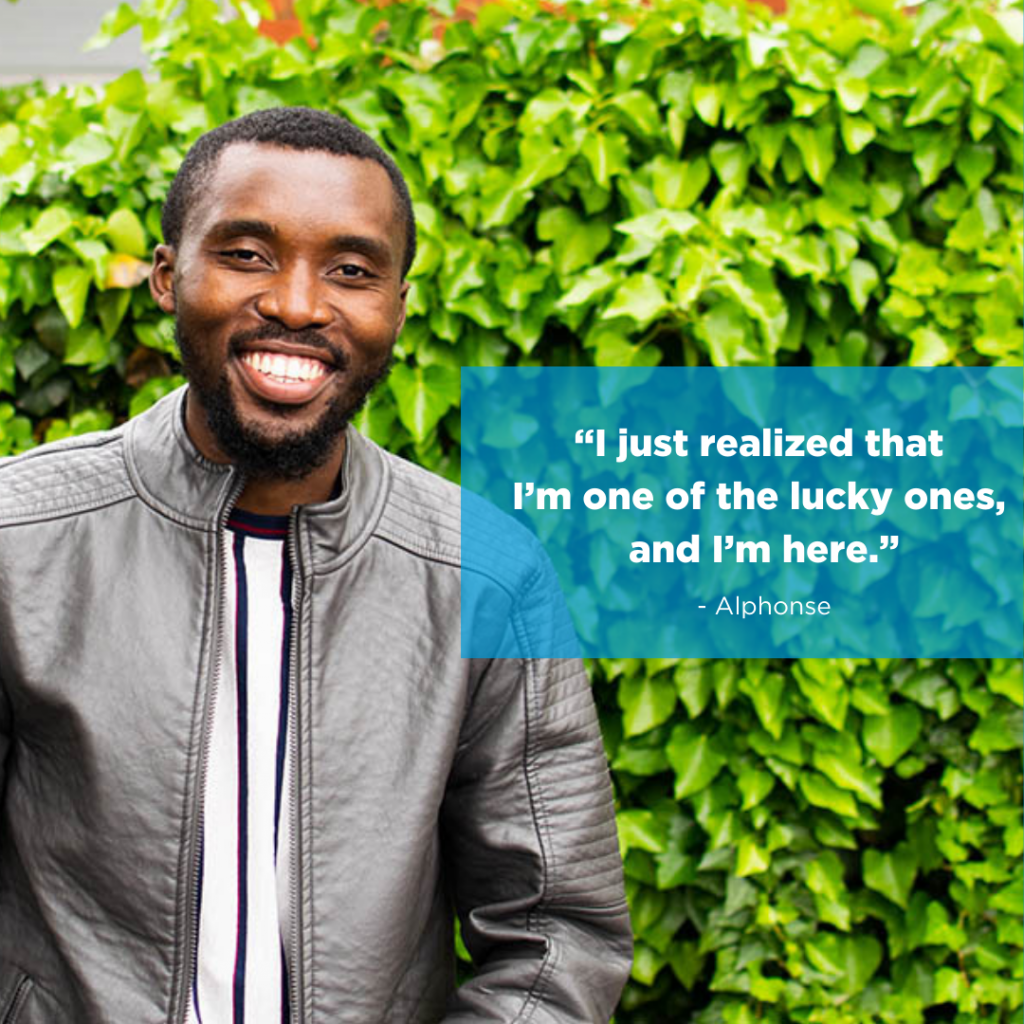
For the next thirteen years, he and his sister waited for news of their visa. As time passed, Alphonse dreamed of America—Los Angeles, New York, Chicago—but he never expected Memphis. When they were told they were moving here, the dream began to solidify into reality as he researched his new home.
From day one, Alphonse began learning how to navigate his new life. However, he was never alone as he might have imagined before. Instead, he had a family of volunteers, World Relief Memphis staff and fellow immigrants there to help him.
“World relief was one of the organizations that helped me make more friends with volunteers,” Alphonse said. “They drove me around, took me out, [encouraged me to] try and move forward, and start looking for jobs. I found my first job.”
With their help, Alphonse began to wade through the culture shock of a new country and language to become an entrepreneur and leader in his own community.
“When somebody leaves their stuff to come help you out, it’s really showing love, because not everybody can do that,” said Alphonse, referring to World Relief Memphis and his team of volunteers. “To see that passion of helping people out, why not support that? You want to see the world as a beautiful place; it is something that you want to put yourself and get into.”
With that thought in mind, Alphonse is doing everything in his power to take care of his community, in particular the youth and the elderly, through his cleaning business and job readiness trainings.
“It’s hard for them because most of them are old, and learning English is not easy for them,” said Alphonse, who would like to run the program in partnership with World Relief Memphis. “I started having the idea that once they first arrive in the United States, showing them how to do things like ‘This is where you have to put your name, your address, your phone number, etc.’”
From there, his hope is that they would then find employment within the city, or perhaps even in his own entrepreneurial endeavors. When not pursuing his degree in Computer Information Systems or working, Alphonse can be found working on his own business cleaning and disinfecting offices.
“We have other people in the community where—they have disability problems where they cant work. Some of them they just feel like they need something simple,” Alphonse said. “I started thinking about coming up with something that might make them feel like they’re doing something, even if it is that little. They know that they have something that gives them a little source of income to support themselves beside having assistance from the government.”
As his business grows, he plans to begin hiring within his community. Yet for the moment, he is focusing on his studies despite the challenges that arrive, such as a pandemic, so that he can in turn focus on his family.
“Life is surprising me every day. It’s getting more surprising every day,” Alphonse said with a chuckle. “I really want to work hard. I want to change my family story. I want to see myself doing something different.”
Coming from a family of doctors and nurses, Alphonse still plans on helping others and giving back to the community, but not in the way that they would expect because of his chosen career field in technology.
“I know technology is one thing back home people still struggle with, so even when I go back I can still be that person [who] bring[s] new changes in the community, in the village, in the society, where people can start knowing things,” Alphonse said.
When he arrived nearly five years ago, he had never dreamed of this new possibility. At the time, his dream was simply to come to the United States. Looking back, Alphonse knows it wasn’t fate or a coincidence, but rather God’s perfect timing.
“I can say everything that has happened to me is God’s hand upon my life,” Alphonse said. “God is really doing amazing things. I can say to start a business and do school while working, it’s not like I’m controlling it. God is helping me every day to keep going, pushing.”
Perhaps one day soon, Alphonse will be helping other refugees realize similar dreams as they begin to arrive in the United States under the increased refugee ceiling. For now, he’ll continue forging ahead to achieve his own and pave the path for others that come after him.
“People just have to keep trying because sometimes, life gives us a different picture than what we think life looks like. But at the end of the day, whatever comes your way, it’s for your own sake and it’s going to be better—somehow, some way,” Alphonse said. “It’s just good to keep trying. That’s how I always do.”
If you want to be a part in helping refugees and immigrants such as Alphonse rebuild their lives and achieve their dreams here in the United States, head to our ReBuild page to see just how you can do so.
To Alphonse, we are so thankful that we were able to be a part of your journey as you arrived in the U.S., and we are incredibly proud of all that you have done. We cannot wait to see what the future holds.
More to Offer: Abe’s Story
In honor of the recently increased refugee cap, we’re sharing stories from some of the brave Quad Cities refugees and immigrants who strive to create a community of welcome for those following in their footsteps. Together, we can [Re]Build.
Mbanzamihigo “Abe” Ibrahim’s first memory of the U.S. is of fireworks. “It was two days away from the Fourth of July. I had never seen, experienced, or even heard of fireworks,” he recalls. On that day, he was blessed with a sense of hope that would last a lifetime.
Abe’s family was granted asylum in the U.S. when he was just ten years old. He had always dreamed of a way to make his mark on the world. But having been “basically born” in a Tanzanian refugee camp, he was never asked what he wanted to do when he grew up. His family was focused on survival.
“I would be done with high school, but probably wouldn’t be doing anything with my life,” he said.
When his family’s case finally made it off the waiting list, Abe was scared. The music, the food, the language – all of that was about to change.
With a little encouragement, Abe’s fear turned into passion. Sometimes, the question “What do you want to do with your life?” is just as important as a safe and accepting environment.
After World Relief Quad Cities helped Abe’s family settle into their new home, he re-enrolled in school. Abe was finally around people who asked him about his future – the support he never realized he needed. “Like a sponge” absorbing information, he learned English in just one year.
Abe reflected the kindness he was shown and quickly began to make new friends.
“When you’re surrounded by good people, you become a good person,” Abe continued.
Most importantly, he didn’t lose touch with his culture. Though he was born in Tanzania, Abe embodies his parents’ Burundian values.
One of those values is community. By showing compassion to others, especially when they’re vulnerable, together we can build loving communities whose actions reach the hearts of everyone involved.
Abe’s main goal in life is to give young people the same support that he received when he was a child. As someone who “looks and talks like them,” he hopes to be a role model they can truly relate to.
While he pursues his psychology degree at St. Ambrose University, he works as a Preferred Community Caseworker at World Relief Quad Cities. Abe regularly shares his story at his organization’s events and is often recognized for his speaking roles at their March 2021 Gala and recent partnership with the Putnam Museum, The Colors of Culture exhibit.
He also holds a platform that advocates for the success of Burundi children, hoping to visit one day and tell them how much they have to offer.
“I want to show them how big the world is,” he said.
From fear and uncertainty to inspiring and educating others, Abe has remained kind and courageous – he will always find more to offer.
Written by Erica Parrigin
Surviving to Thriving: Dim’s Story
In honor of the recently increased refugee cap, we’re sharing stories from some of the brave Quad Cities refugees and immigrants who strive to create a community of welcome for those following in their footsteps. Together, we can [Re]Build.
When Dim was a child, her father had to leave Myanmar to work in another country. It was the only way for her family to obtain a survivable income. Today, minimum wage in Myanmar is 4,800 kyat, or $3.00 US. It was even less when Dim was growing up. She felt discouraged as she watched her loved ones labor away in exhausting rural jobs that left them unable to afford necessities like food and medical care.
“In Myanmar, it’s hard there. Even if you work hard you don’t get paid a lot. We didn’t see a lot of other people because we lived in a small town. We had narrow-minded people. There was nobody to dream,” she said.
But Dim has always been a dreamer. She imagined a future where she could take care of her family and friends.
Her parents thought about her education while they worked. Determined to help their daughter achieve her dreams, they moved to Malaysia and enrolled her in school for the first time.
When Dim entered high school, however, her opportunities were interrupted. She couldn’t continue her schooling unless they moved again. The family knew the transition wouldn’t be easy, but they refused to accept the “this is how it will always be” mindset that was so common in their previous home.
In 2016, they decided to permanently resettle in the US. Dim was amazed to see the welcoming crowd at the airport and knew everything was about to change.
“World Relief Quad Cities made sure we had food and furniture. When we got here, everything was already in our house. They helped us to go to the doctor, taught us how to use everything, how to go somewhere, and they even taught my mom how to take a bath,” she recalled. She quickly understood English with the help of a caseworker who visited her house and began to excel in her high school classes.
The college education that had been just out of Dim’s reach suddenly became a reality when she was accepted to Augustana. She plans to major in chemistry and hopes to become a dentist. For Dim, dentistry illustrates what it means to “love thy neighbor.” Her neighbors in Myanmar never knew dental care existed.
“We didn’t know what dentistry was, but when I came here, World Relief Quad Cities helped me get dental care. If I become a dentist, I’m going to help people back in my country.”
With her brightness and enthusiasm finally given room to grow, Dim has embodied a mission to rebuild the lives of the vulnerable. She can’t wait to inspire joy and confidence by bringing new smiles to small communities like the Myanmar town she once felt restricted by.
Ultimately, she wants to show others that there’s more to life than survival.
“I still have a lot to learn, but everything is better now,” she added. With the days of draining physical labor behind them and goals to look forward to, Dim and her family are no longer just surviving – they’re thriving.
Written by Erica Parrigin










